How to win in an economic crisis
There is a debate among economists these days. Some say we will have a crisis soon, others say we are already in one. However, some say we will never have an economic crisis. I will dismiss the latter and will write about what the case would be if we were to have an economic crisis.
When people have less money to spend, the startup world will be affected as well. Those companies who create more value for their customers will prevail and become bigger. During the crisis of 2001, coupon companies flourished. There were two main reasons. People had less money and companies had lots of stocked goods to sell. However, after the crisis, people lost interest in those coupon companies and moved on to regular e-stores.
Hence, Turkish e-commerce has risen to heights because of a deep economic crisis. The same could happen again. When people care more about the price, online sales usually go up. This time, with Amazon’s plans to enter the Turkish market, this transition from regular stores to e-stores will be even faster.
However, coupon companies may not foster as much as before because in the last 10 years, the customer profile has changed a lot. People no longer tolerate unfair treatment, even if they pay impossibly low prices. The reason why people lost interest in coupon companies after the crisis was mainly because they received inferior services and products from those e-stores. For example, when people bought coupons for a restaurant, they were seated in the worst possible tables and received smaller portions than regular paying customers.
This problem needed to be addressed.
As far as I can tell, the startup Kuponsa did exactly that. They are not a coupon company. Instead, they provide you with a monetary incentive without hindering the experience along with it. Therefore, its customers can experience new things for less money with dignity.
They provide their customers with a “buy one get one free” option. So, if you go to a coffee house and drink two cups of coffee, you only pay for one. The same goes for education from Tezgahçılar. They have many more interesting options and they are expanding.
I feel that in the future these type of new approaches will foster quicker. If you are an investor or want to be an entrepreneur, you could look into these types of business models for quick wins.











